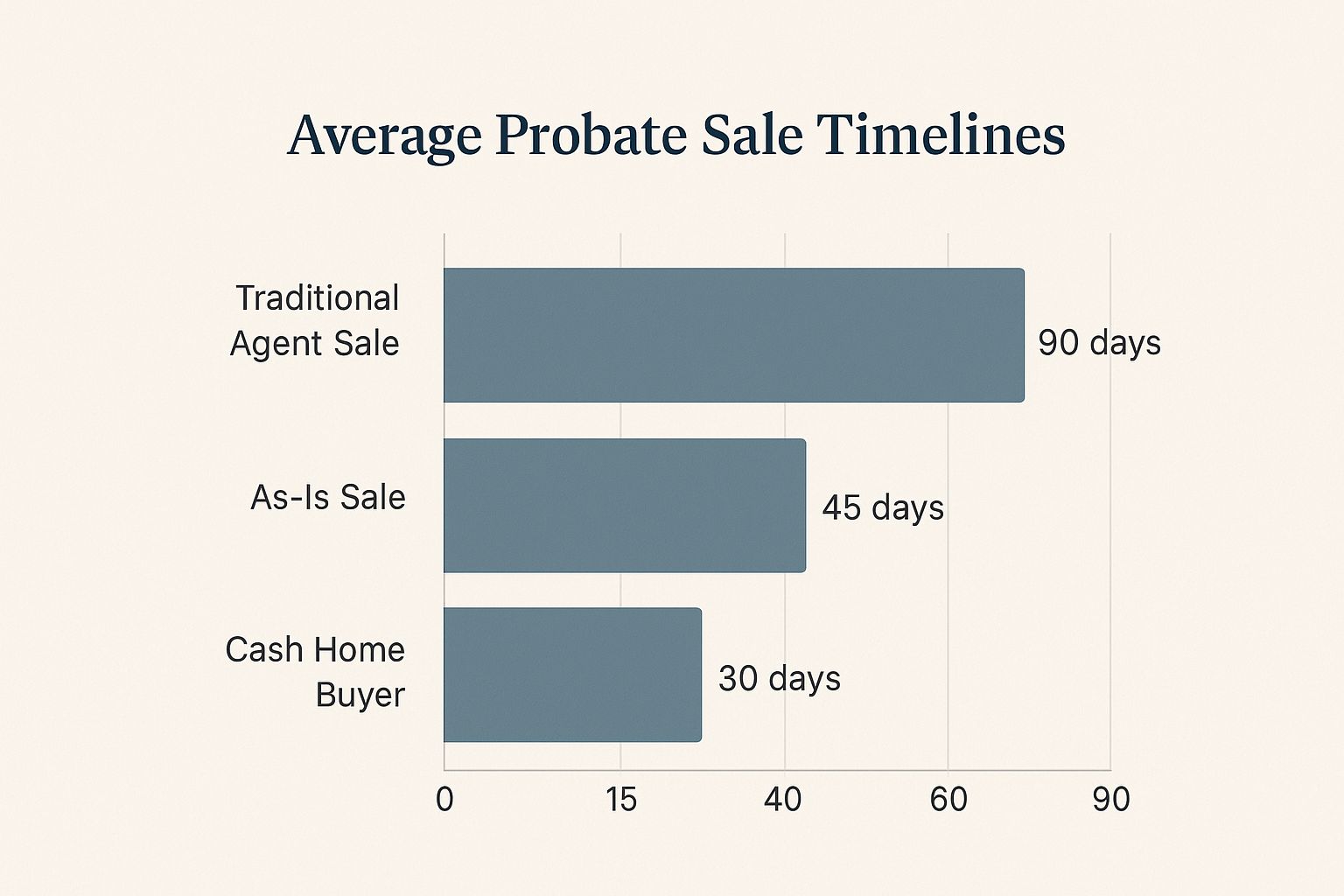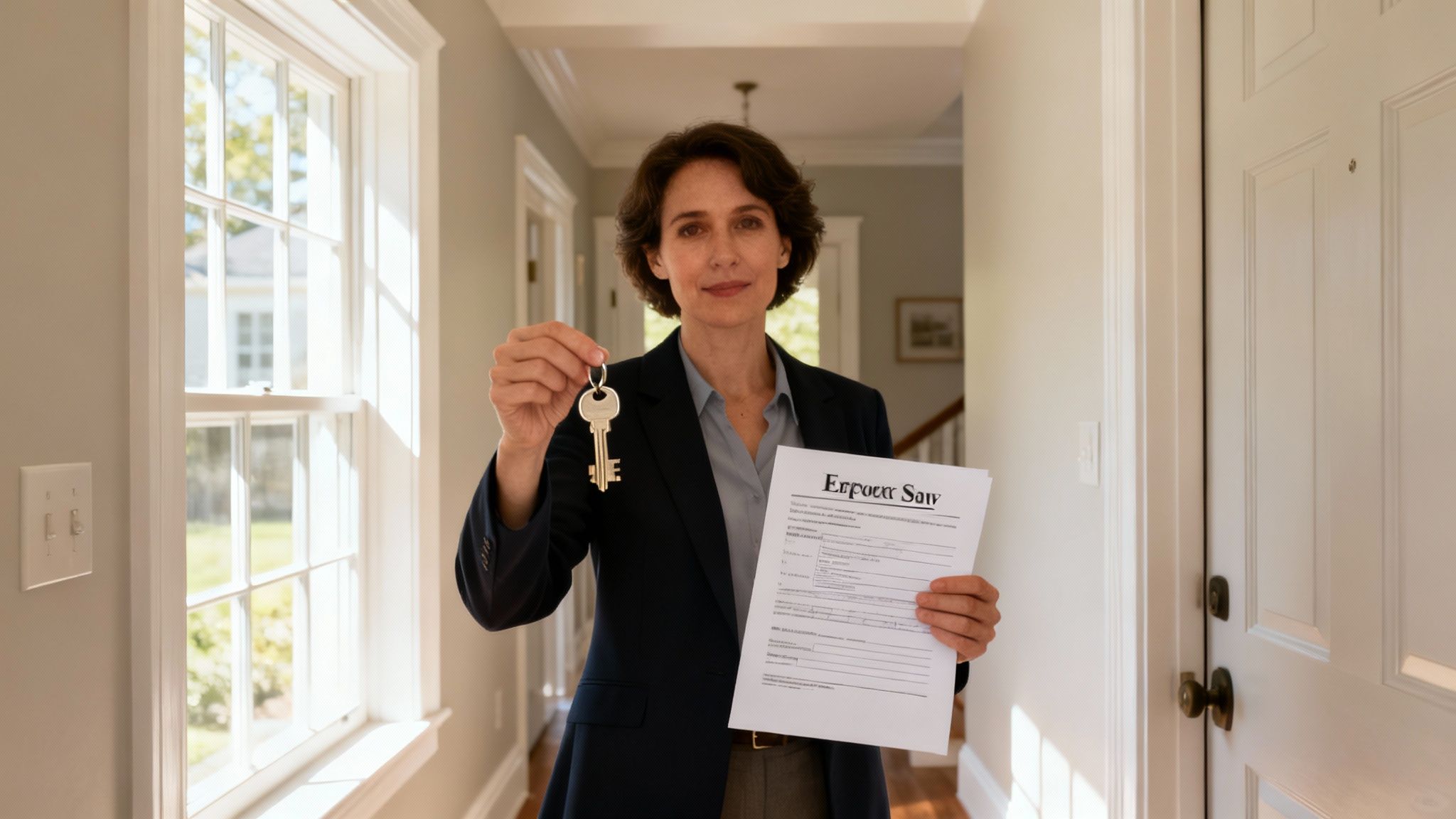The process of selling a house through probate may seem complicated but understanding the necessary steps will make it easier to handle. A quick sale is achievable but it requires you to first fulfill certain legal requirements.
You can sell a house during probate but only when the court has named an executor (or personal representative) who has obtained the court’s approval to sell the property. This key step, documented in “Letters Testamentary” or “Letters of Administration,” unlocks your ability to move forward.
Your Quick Guide to Selling a Probate Property
The executor holds three main options to sell property after gaining legal authority: work with a real estate agent or sell independently through For Sale By Owner or sell to a cash home buyer. The different options require varying amounts of time and work and produce distinct financial results. The first step to making the best decision for the estate requires knowing these factors.
The estate must select the appropriate path which focuses on either achieving the highest sale value or completing a quick and straightforward sale to pay off debts and distribute assets to beneficiaries.
To help you decide, let’s compare the options.
Your Sale Options for Probate Property: A Comparison
This table outlines the key differences between your main choices for selling a probate house, focusing on speed, cost, and convenience.
| Sale Method | Typical Timeline | Pros | Cons |
|---|---|---|---|
| Traditional Agent Sale | 3-6 months | Potential for highest sale price. | The traditional agent sale method demands a slow process through home repairs and staging and agent commissions of 5-6 percent and buyer financing risks of failure. |
| For Sale By Owner (FSBO) | 2-4 months | No agent commissions. | You will be in charge of all marketing activities and showing the property to potential buyers and handling negotiations and completing all legal paperwork. The process requires a lot of time and can cause a lot of stress. |
| Cash Home Buyer | 7-14 days | Fastest closing, no repairs needed, no commissions, certain sale. | The offer you receive might not match the full market value of your property. |
Your selection of route will determine both the time needed and the amount of work involved. A traditional sale aims for top dollar but comes with months of uncertainty and work, while a cash buyer offers certainty and speed.
The infographic presents a timeline which shows the estimated time needed for each probate house selling approach.

The data shows that professional home buyers complete transactions at a rate which surpasses traditional market listings by a wide margin.
Our complete guide on selling inherited property provides in-depth information about this particular situation. The right choice at this moment will stop you from waiting for a long time and reduce your future stress levels.
Making Sense of Probate Timelines and Legal Requirements

The court supervises probate as its official process to handle the transfer of assets from a deceased person. While it’s a necessary legal step, it’s rarely a quick one. If you want to sell your house through probate quickly then you need to start by learning about the probate process timeline.
The process starts when an executor files the will together with a petition to the probate court. The process begins with mandatory legal steps which include notifying all potential heirs and creating a detailed inventory of the estate’s assets. The court needs to provide authorization to the executor before they can start listing the house for sale.
People often believe they can avoid probate court by selling their property quickly. A “fast” probate sale requires moving quickly through all legal steps because it does not allow you to skip any of them. The court establishes its own timeline and requirements which must be followed.
Key Stages and Potential Delays
Each stage of the probate process contains potential delays that can occur throughout the entire process. The court establishes a waiting period for creditors to file claims against the estate following the initial petition submission. The process needs multiple months to finish.
The following obstacles tend to slow down the sales process:
- Disagreements among heirs: The sale process will get stuck until the court steps in when beneficiaries disagree about selling or price terms.
- Unexpected creditor claims: A surprise debt can disrupt the estate’s finances and pause any plans to distribute assets, including proceeds from a home sale.
- Paperwork errors: A simple mistake or a missing document can lead to a rejected filing, forcing you to start over and adding weeks or months to the timeline.
The legal framework knowledge enables transactions to operate smoothly. The guide for Texas probate navigation offers essential information to executors and beneficiaries which applies to all individuals who need this knowledge.
Setting Realistic Expectations for Your Timeline
The average duration of a standard probate case in the United States ranges from six months to one year but complex estates might need additional time. The real estate market creates additional uncertainty because it operates in a state of constant change. The need to pay estate taxes and legal fees and complete the estate process can force heirs to agree to inadequate offers.
The quickest way to sell requires both a patient approach and complete knowledge of legal requirements. The knowledge of rules at the beginning enables you to foresee obstacles which lets you cooperate with the system instead of fighting against it.
Understanding the Executor’s Role and Authority to Sell

The executor (or personal representative) serves as the main individual who facilitates the probate process when you need to sell a house quickly. The court appoints this person to perform estate administration duties for the deceased.
The executor must handle various duties in their position. The process requires finding all assets and creating an inventory and notifying heirs while settling outstanding debts. The court requires formal approval from the executor before any property sales can proceed through Letters Testamentary or Letters of Administration. This document is the key that unlocks the ability to sell.
Full Authority vs. Limited Authority
The duration of the sale process depends on whether the court has given the executor complete authority or restricted authority. The difference between these two options will determine whether the transaction will finish quickly or drag out for extra months.
Here’s what these terms mean for the sale:
- Full Authority: This is the ideal scenario for a fast probate sale. The Independent Administration of Estates Act (IAEA) grants full authority to executors in numerous states which lets them perform duties similar to homeowners. The agent can list the property and handle negotiations and final sales without needing court approval for every step.
- Limited Authority: This is the slower path. With limited authority, the court must approve nearly every major decision. The court must approve every stage of the process from listing price to accepted offer to final sale. This process requires additional paperwork and multiple court appearances which results in extended waiting periods.
Executor Tip: When you submit your court petition you should ask for complete authority at the beginning of the process. It demonstrates that you are prepared to manage the estate efficiently and is the single most effective step you can take to expedite the sale of any real estate involved.
The executor gains full authority which enables them to make quick decisions and remove bureaucratic obstacles and handle buyer negotiations. The position of an executor carries important legal duties which require understanding their proper conduct limits. For additional details you can investigate whether an executor possesses the authority to change a will.
When handling a probate sale, it’s easy to focus solely on the legal paperwork. The property exists within the broader real estate market which will strongly affect how the sale unfolds.
The speed and price of your home sale will depend on current mortgage rates and available housing inventory and buyer interest in your area.
Getting the Price Right in Today’s Market
A seller’s market with low inventory and high demand will result in multiple offers appearing quickly even for properties that require repairs.
Your pricing approach needs to become highly competitive when homes stay on the market for months in a buyer’s market to draw in potential buyers.
Pricing is critical. If the house has significant issues like a dated kitchen or a faulty roof, these repair costs must be factored into the asking price. A property that requires updates will remain on the market longer when it is priced too high which results in ongoing expenses for taxes and insurance and utilities that drain the estate’s financial resources.
People often make the mistake of setting home prices based on personal emotional value and family expectations instead of actual market conditions. A realistic, data-driven price is the foundation for a successful and timely sale.
The lack of affordable housing stands as the primary obstacle which blocks most people from buying a home. The National Association of Realtors states that housing inventory has increased slightly yet remains limited while buyers continue to focus on price.
An estate must maintain a delicate equilibrium which this situation creates. To sell the house fast during probate, you will likely need to price it competitively to stand out. The method enables sellers to find serious buyers while preventing extended market exposure which helps executors complete their responsibilities effectively. Our guide on how to sell your house quickly provides general advice about this topic.
Exploring Your Best Options for a Fast Sale

The court will decide the best way to sell the house after it grants the executor power. The choice will determine how fast you can finish the sale and estate closure. The different options you have will affect both how fast you sell and how much work you need to do and what price you get in the end.
The most common path is hiring a real estate agent and listing the home on the open market. The method is usually employed to reach the highest possible selling price. The method operates at the slowest speed of all available options. The house sale process demands home repairs and staging and financing risks and last-minute financing problems with buyers.
The Cash Buyer Alternative: A Probate-Friendly Solution
A cash home buyer offers a quick and direct property sale as their main service to clients. The option provides users with the best combination of speed and ease of use. A cash buyer will make an offer based on the property’s present condition which means you do not have to worry about repairs or updates or clearing out your belongings.
The process avoids the typical delays which occur in a conventional sale:
- No Repairs Needed: The buyer assumes responsibility for all issues after the sale.
- No Public Showings: This eliminates the need to prepare for and host numerous potential buyers. A single walkthrough is often sufficient.
- No Commissions or Fees: Reputable cash buyers often cover all closing costs, so the offer price is what you receive.
- Certainty of Closing: Since cash buyers use their own funds, there’s no risk of a bank denying a mortgage and derailing the deal.
Making an Informed Choice
The property needs to be emptied before you start selling it. A system helps people handle their personal belongings because managing them represents a major task. The guide provides useful advice about packing for a house move which will help you get started.
The correct choice depends on which goals the estate wants to achieve. If time is not a pressing issue and achieving the highest possible price is the main goal, a traditional listing may be the best fit. A cash sale stands as the most efficient method to sell a house during probate because it enables fast debt settlement and asset distribution to heirs and estate closure.
You should look for companies that specialize in these transactions to help you if you want to explore this option. Eagle Cash Buyers operates through probate sales to offer fair cash deals without any commitment required. The process enables executors to avoid the complex procedures of standard listings while moving forward with assurance. For more details, explore our guide on how to sell my house fast for cash.
The process of navigating a probate sale becomes complicated when legal requirements merge with emotional difficulties. The natural state of things leads to questions. Here are answers to some of the most common ones we hear from executors and heirs.
People Also Ask: Common Questions About Selling a House in Probate
https://www.youtube.com/embed/lGU73bZA9wc
Can you sell a house before probate ends?
The executor needs to wait until the court grants probate before they can complete the sale. The court needs to issue “Letters Testamentary” or “Letters of Administration” before an executor can proceed. The executor needs this document to handle estate matters including selling the house.
The process to start your business can begin right away. Several useful steps exist for you to complete while the court process continues. The property needs to be cleared of personal belongings and urgent maintenance work needs to be done. The property value needs to be assessed by an expert who will determine its market value. Your options include interviewing real estate agents or seeking a no-obligation cash offer from professional home buyers to understand your choices.
The court must approve the final sales contract before you can proceed with your preparations.
How long does probate take?
When your goal is to sell a house fast probate, you’re dealing with two consecutive timelines.
The court process itself begins at the start of the process. The probate process takes between six and twelve months to complete but court backlogs and estate complexity might extend the duration past that timeframe.
The home sale process starts when the executor gains authority to sell the property. A traditional real estate agent requires an additional two to four months for listing and showings and negotiations and closing.
This two-part timeline often surprises families. The timeline accounts for the house sale process but it does not include the extended court proceedings that take place before the sale. A cash sale can shorten the second timeline from months to 7 to 14 days.
What happens if heirs don’t agree on selling?
The probate process becomes more complicated when beneficiaries start to disagree about the distribution of assets. People tend to fight because of emotional responses during times of intense stress.
The executor must make decisions which benefit the entire estate when heirs disagree about property sales.
The executor can request court authorization to sell property when needed. A judge will approve this request to sell property when it becomes necessary to pay off estate debts and administrative expenses and to distribute assets according to the will between heirs. The court will decide to dismiss the complaints from one or more beneficiaries.
The best way for an executor to sell a probate property without market delays is to explore all available methods. Eagle Cash Buyers delivers quick and straightforward all-cash offers to customers who want speed and simplicity. Our team specializes in probate sales so we can work with you to finalize the sale at your preferred time which enables you to close your estate without any rush. Get Your Free Cash Offer Today.





